Three Minute Thesis Competition is becoming a new CHC tradition
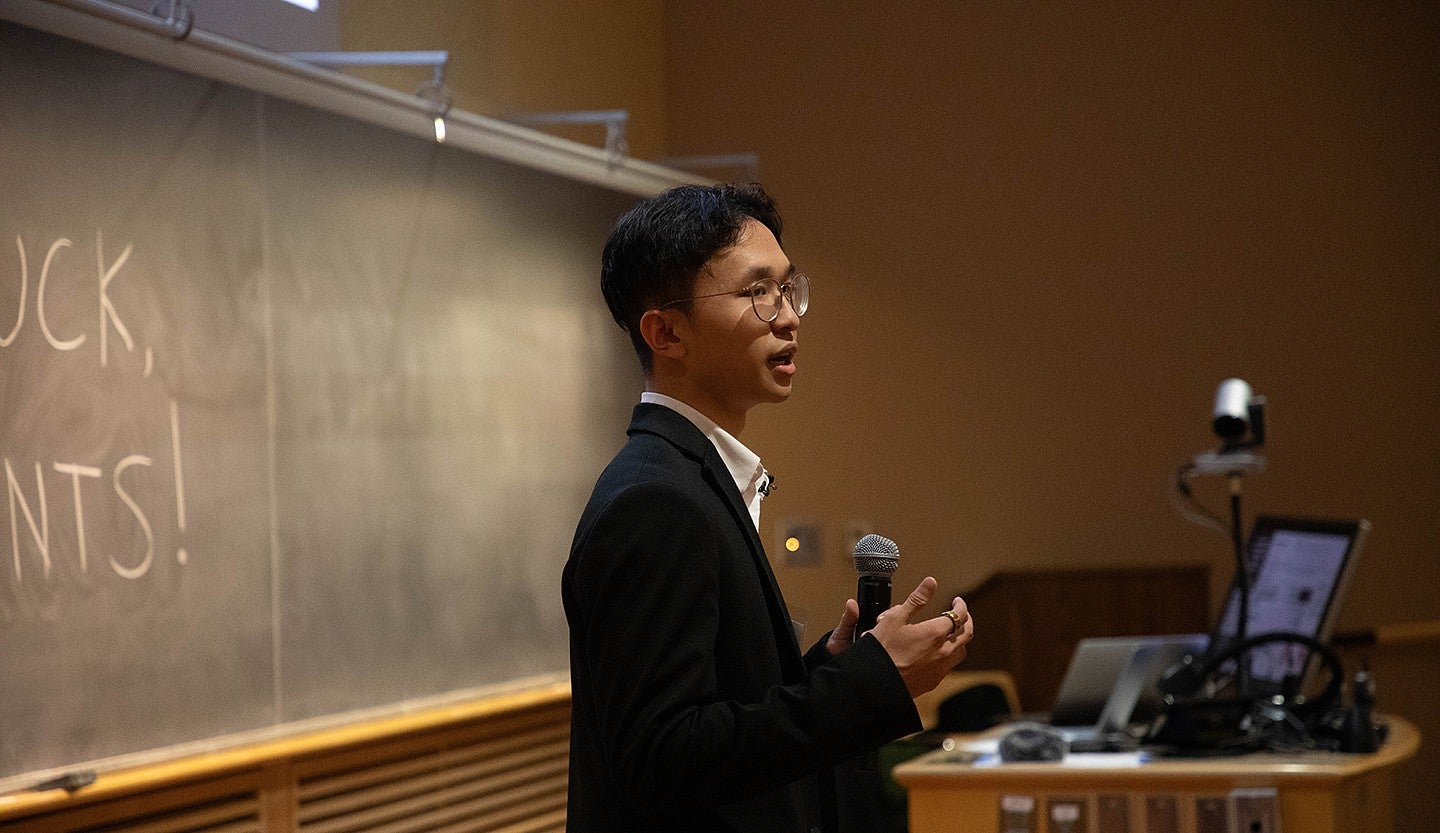
The Winners
1st Place ($750):
Ethan Dinh
Proteomic Signatures of Tibial Bone Stress Reinjury
2nd Place ($500):
Alex Staben
Active Travel to School: Analyzing Barriers and Finding Solutions for Students of River Road/El Camino del Río Elementary in Eugene, OR
3rd Place ($250):
Alyson Johnston
Blind, Deaf, Accomplished, and Discredited: How Helen Keller’s Legacy Evolved with New Media
People's Choice:
Bryn Callie
In the Neighborhood: Phenology, Species Interactions, and Community Engagement in Ecological Research
In front of a packed auditorium filled with students, faculty, staff and a variety of guests, senior Ethan Dinh took home the first-place title in the Second Annual Clark Honors College Three Minute Thesis Competition on Thursday, April 25, 2024.
Dinh, a computer science major, gave the winning presentation on his CHC thesis topic, “Proteomic Signatures of Tibial Bone Stress Reinjury.” Using a conversational tone and a quick wit, he was able to convey a complete understanding to the audience about his study of fractured leg bones in recreational women athletes.
His study focused on how measuring the bone density of women who had previous fractures of the tibia and conducting a biomarker analysis on their blood can help predict future fractures.
The CHC event – held in a second-floor classroom auditorium in the UO Lundquist College of Business – featured 10 student finalists who had three minutes and one slide to fully explain their theses projects to the audience. Dinh took home the top prize of $750.
Dinh, who was awarded the prestigious Barry Goldwater Scholarship last year and served as a Knight Campus Undergraduate Scholar, acknowledged being “a little nervous” leading up to his presentation. He practiced multiple times but never gave the same performance. And even though he forgot to turn on the microphone when he started his presentation, his steady voice and laid-back style projected well to the judges and the audience.
“The way that I present most times, I try not to go into it so structured,” he said after the event. “But when I got up there, I tried to keep it light and go with the flow of the audience. It was so nice to see all the faces in the crowd.”
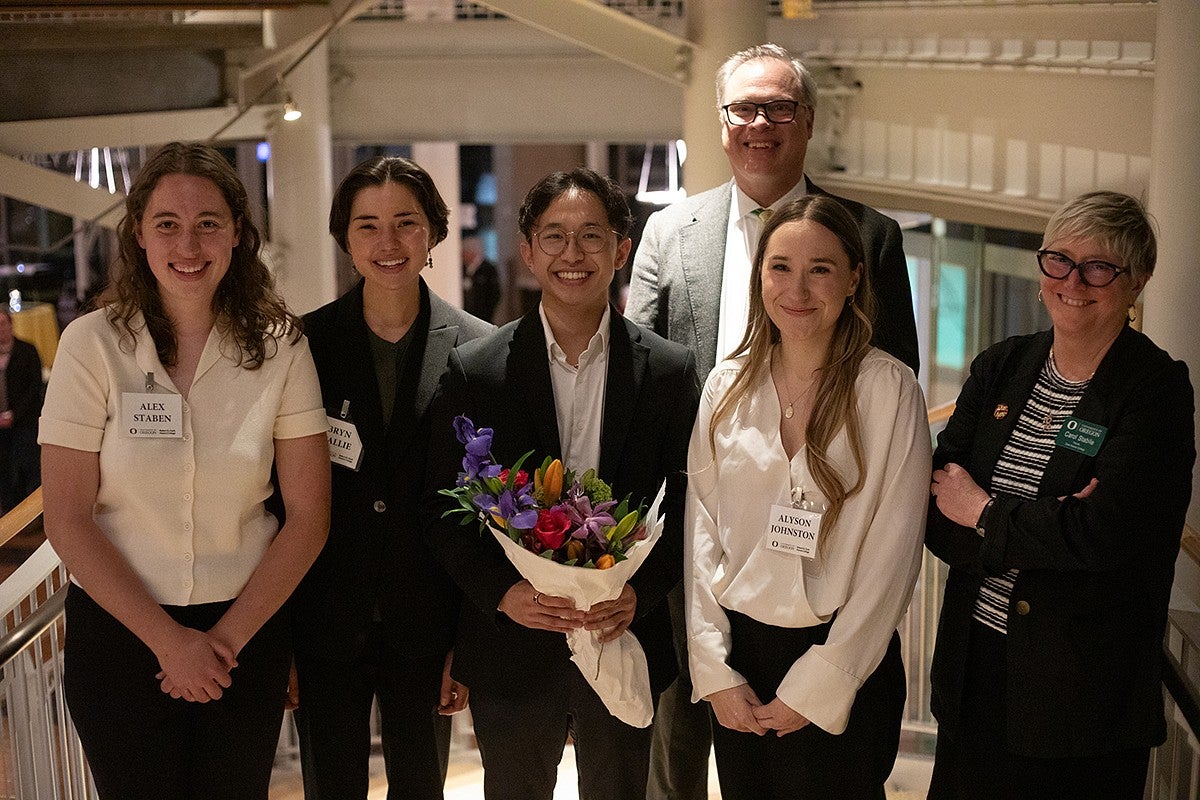
As a student in the Guldberg Lab at the Knight Campus for Accelerating Scientific Impact, Dinh works closely with his mentor, Genevieve Romanowicz, a post-doc in the lab, on musculoskeletal research. He said becoming a doctor has always been his dream. But Romanowicz is chiefly responsible for showing him how to look at medicine through a computer-science lens.
“The way that I present most times, I try not to go into it so structured, but when I got up there, I tried to keep it light and go with the flow of the audience. It was so nice to see all the faces in the crowd.”
Alex Staben, a senior who is majoring in Spanish and environmental studies, took second place and a $500 prize. Her presentation – “Active Travel to School: Analyzing Barriers and Finding Solutions for Students of River Road/El Camino del Río Elementary in Eugene” – focused on the disparities faced by some schools in finding safe walking and biking pathways to school.
In her research, Staben found that relying on motor vehicles to get children to school has been so normalized that some families don’t consider the health benefits of walking or riding bikes.
"I chose the school because it didn’t have a safe routes to school map and there are some really obvious walking and biking solutions for families,” said Staben, who works as an intern for the Eugene School District 4J. “I wanted to have an impact on the culture of car dependency.”
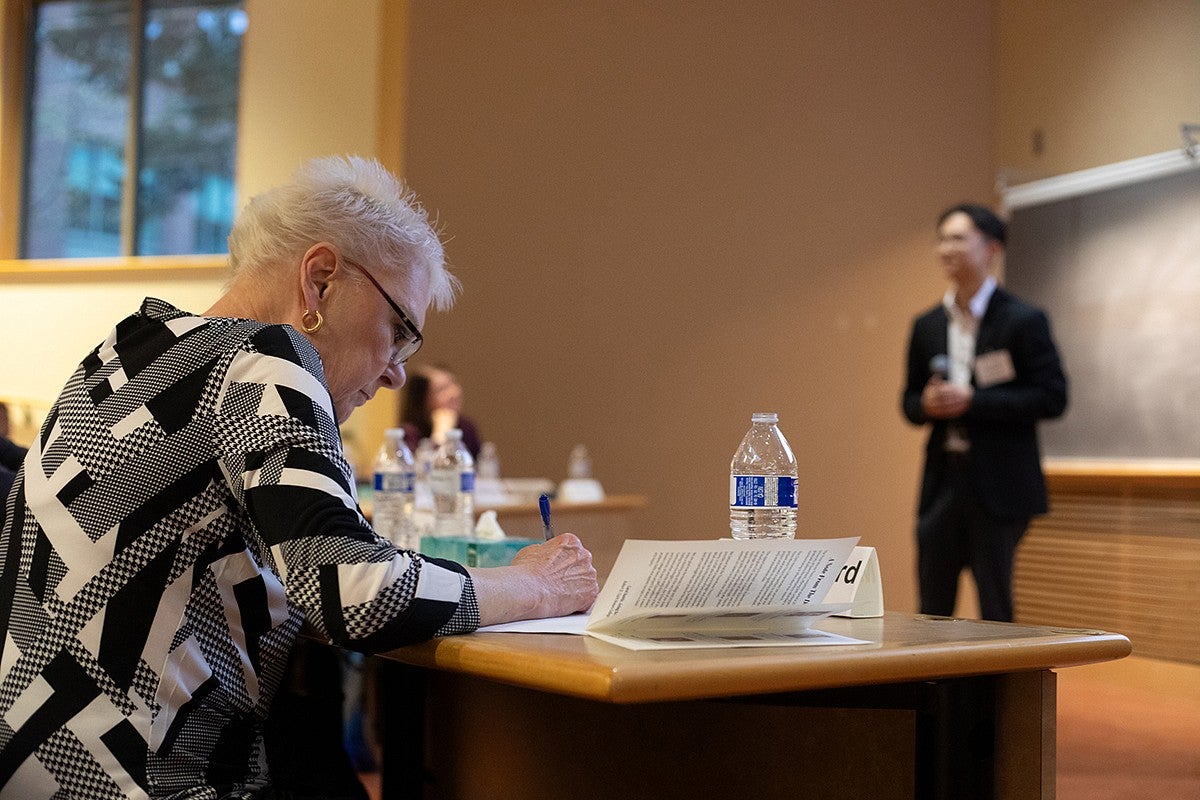
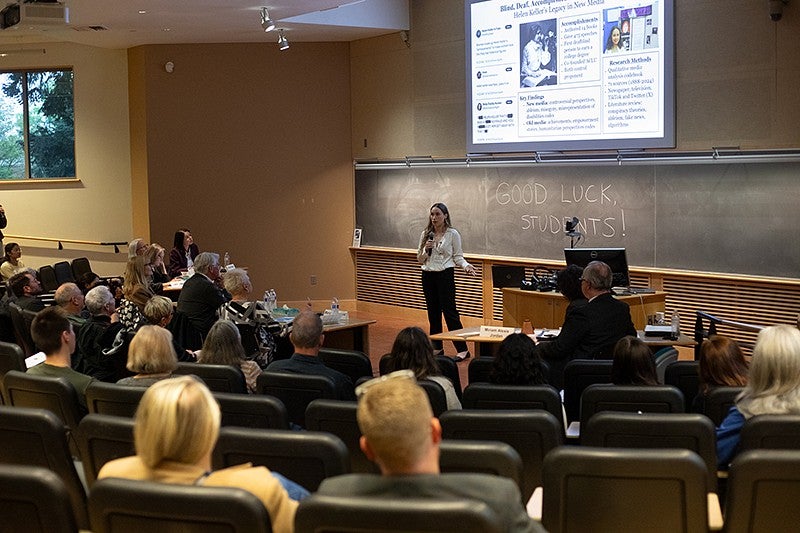
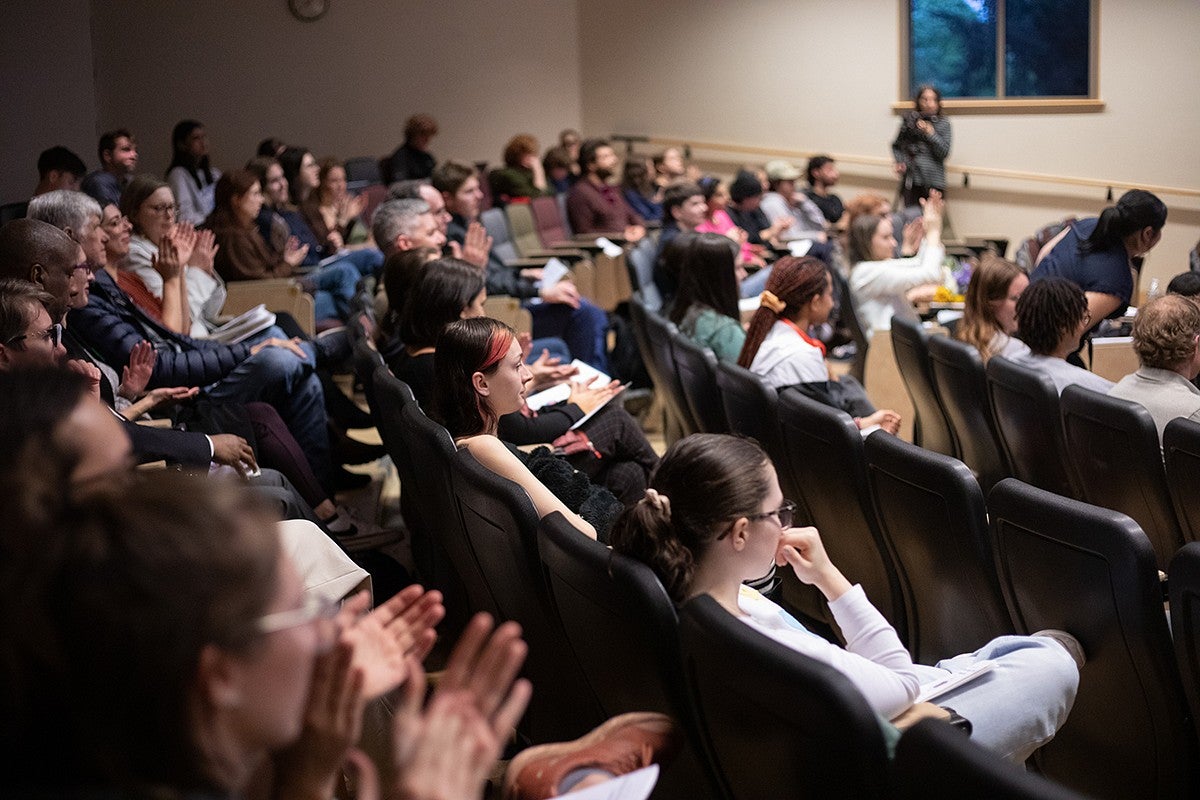
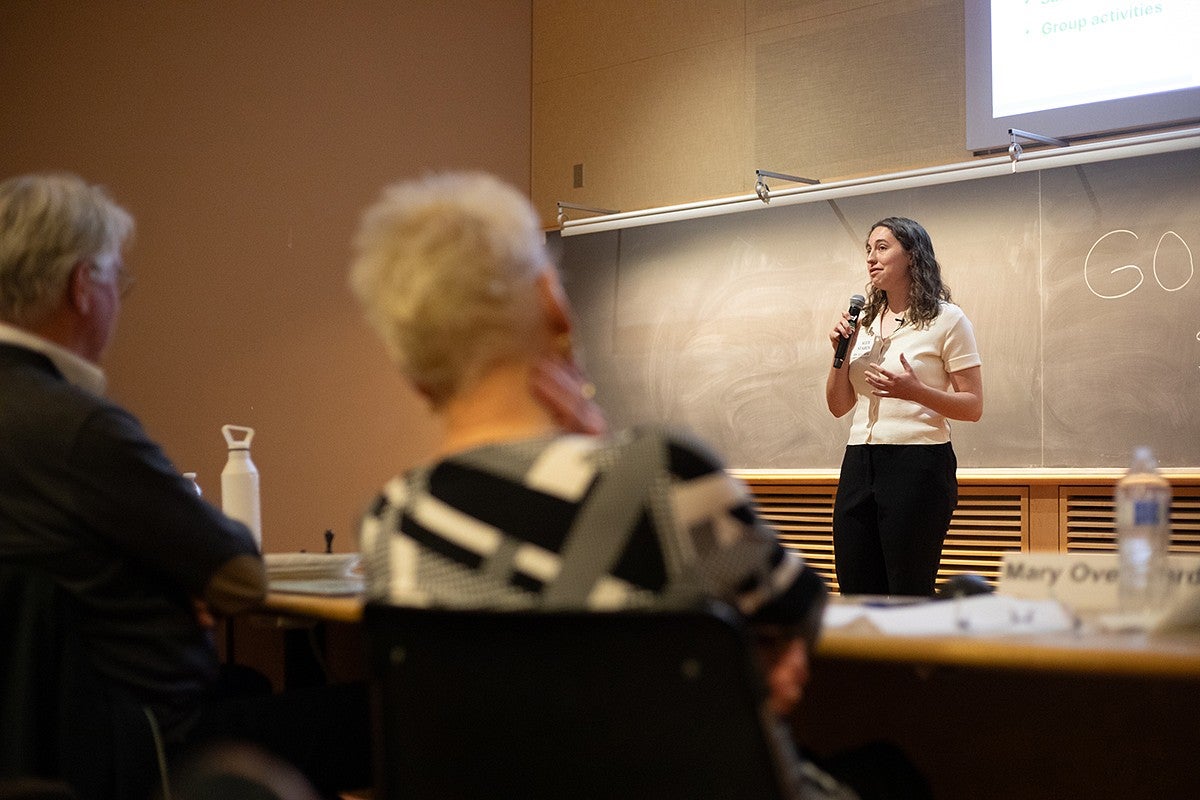
Senior Alyson Johnston, a journalism major, garnered third place and a $250 prize with her presentation of “Blind, Deaf, Accomplished, and Discredited: How Hellen Keller’s Legacy Evolved with New Media.”
As a second grader, Johnston idolized Keller, who was both deaf and blind but had a trail of significant accomplishments in her lifetime. Five years later, Johnston was diagnosed with Stargardt disease – an affliction that caused her to lose nearly half her vision.
Her slide featured a series of blistering critiques of Keller that included misogynistic and coarse language, calling Keller’s legacy into question. Johnston’s research analyzed new and old media sources and how each portrayed a woman who had co-founded the ACLU and was the first deaf/blind person to graduate from college in the United States.
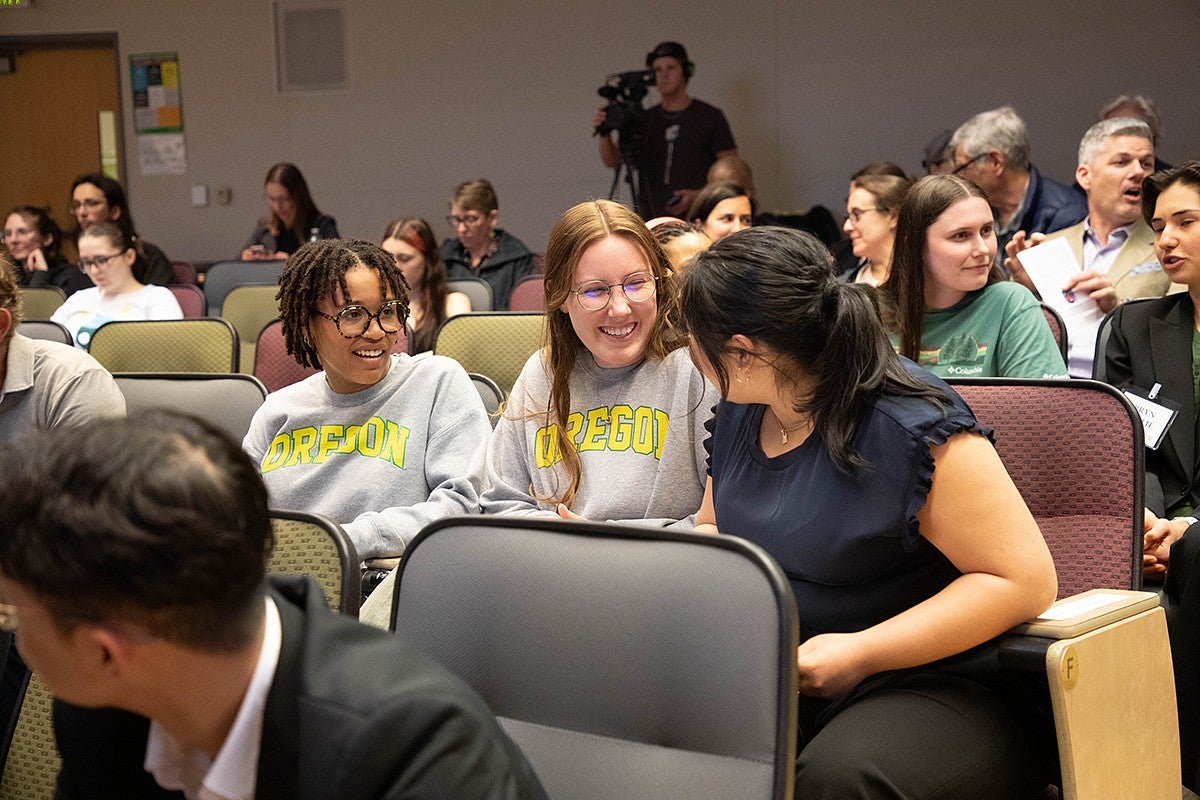
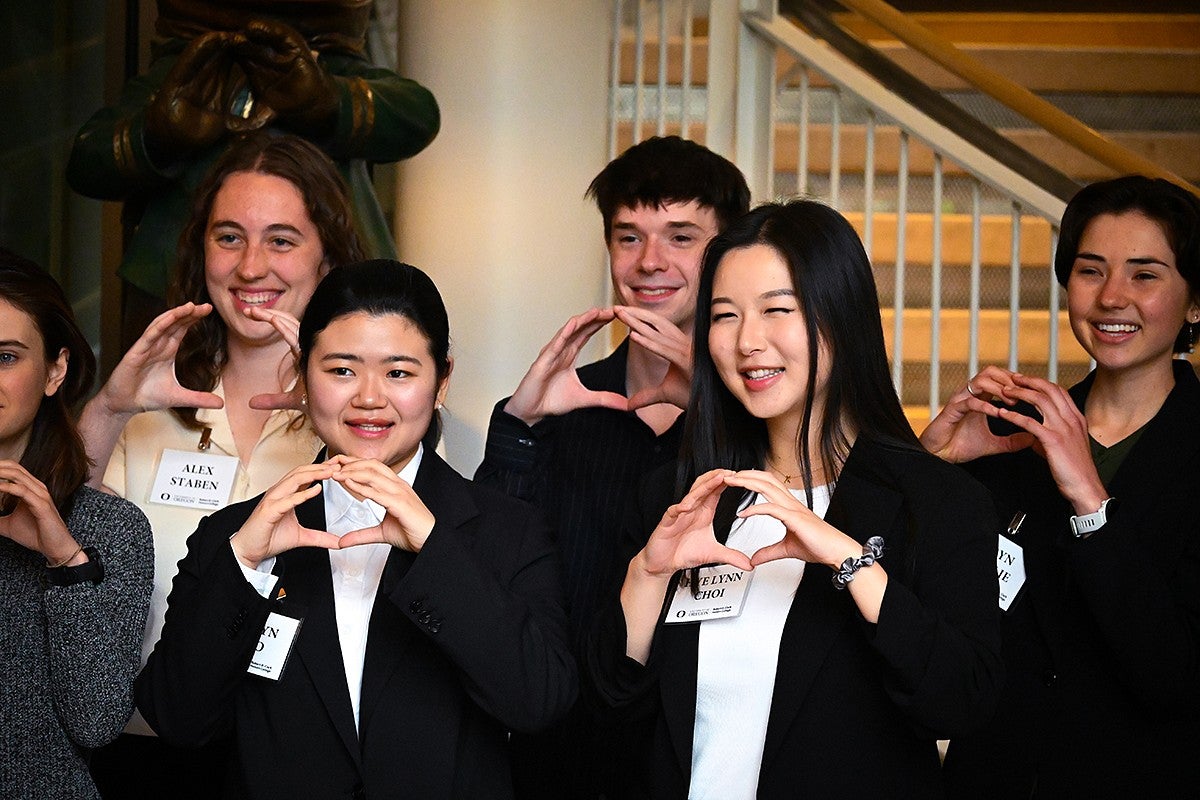
“It felt really rewarding to know that the judges appreciated my thesis work and my personal story,” Johnston said. “I was really nervous until I walked onto the stage. I realized I was more than ready to talk about the project I have spent the last year working on.
“I wanted the audience to take away that having a disability doesn’t define or limit a person – both in the context of me and my subject. This was one of the first times I’ve shared my own story in the context of academics. It was really scary at first, but I was proud of how things went.”
“It felt really rewarding to know that the judges appreciated my thesis work and my personal story. I was really nervous until I walked onto the stage. I realized I was more than ready to talk about the project I have spent the last year working on.”
Watch each of the 10 finalists give their presentations at the Three Minute Thesis Competition.
Judges at the CHC event scored participants on background and significance, research and implications, outcomes and impact, oration, language and delivery. They also considered audience enthusiasm, as well as the contents of the presenter slides.
“The event captured so much of what’s distinctive about the Honors College experience — high-striving students presenting their research and findings on subjects of urgent importance,” said Interim Provost and Senior Vice President Karen Ford, who served as one of the judges for the event.
“I was amazed at their ability to summarize, visualize, explain, engage, and persuade in the time it takes to cook a soft-boiled egg! The evening was illuminating and enjoyable, and it was heartening to experience the intellectual and professional promise of our students.”
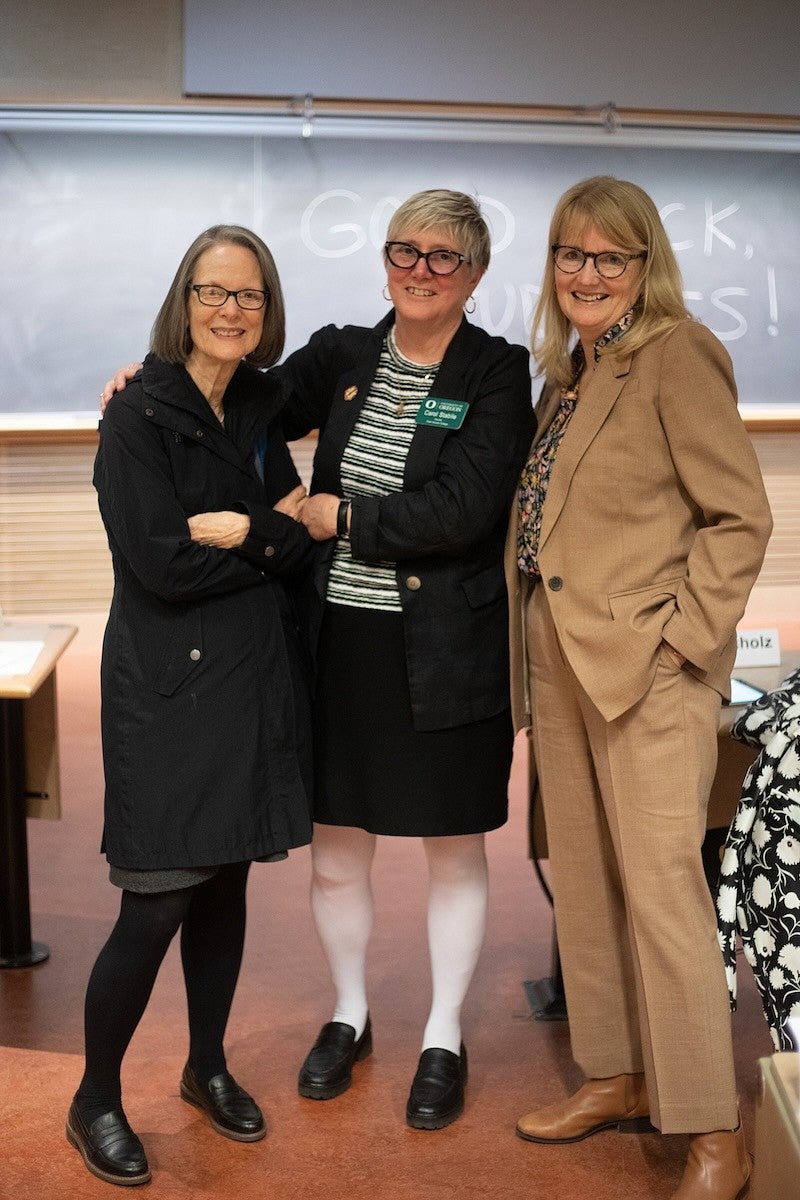
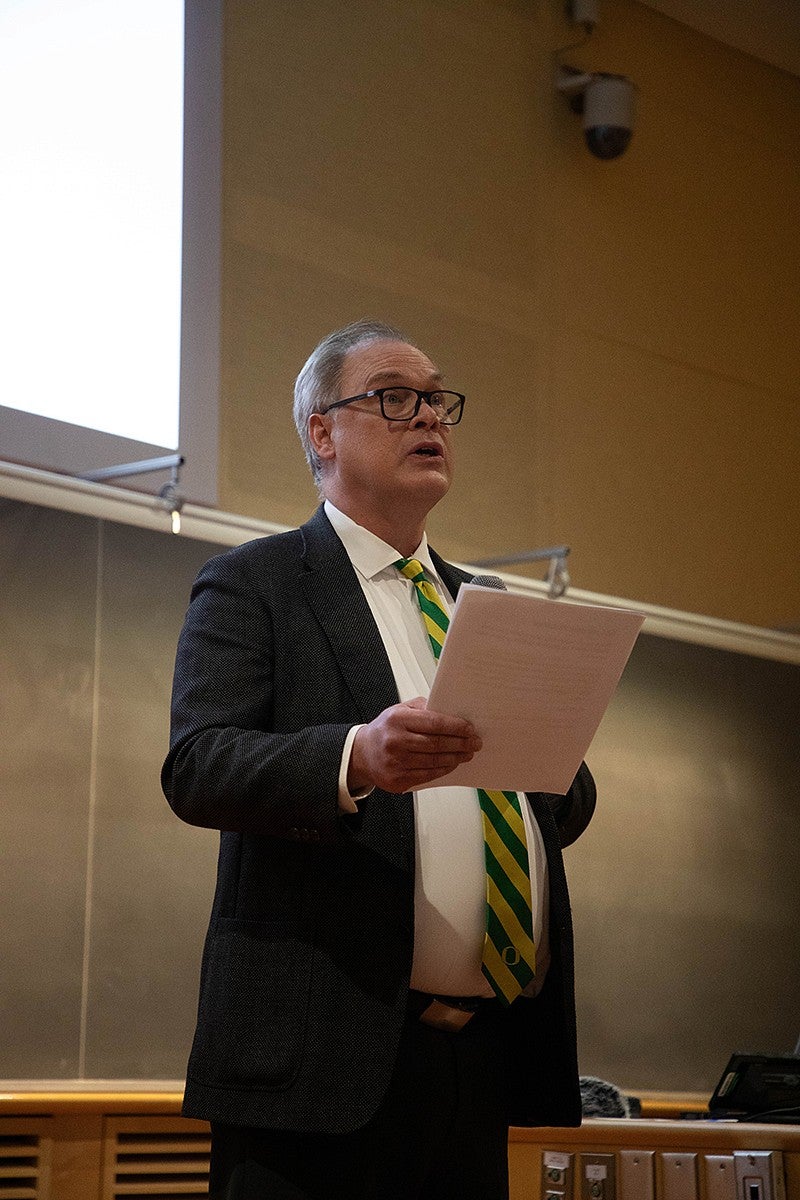
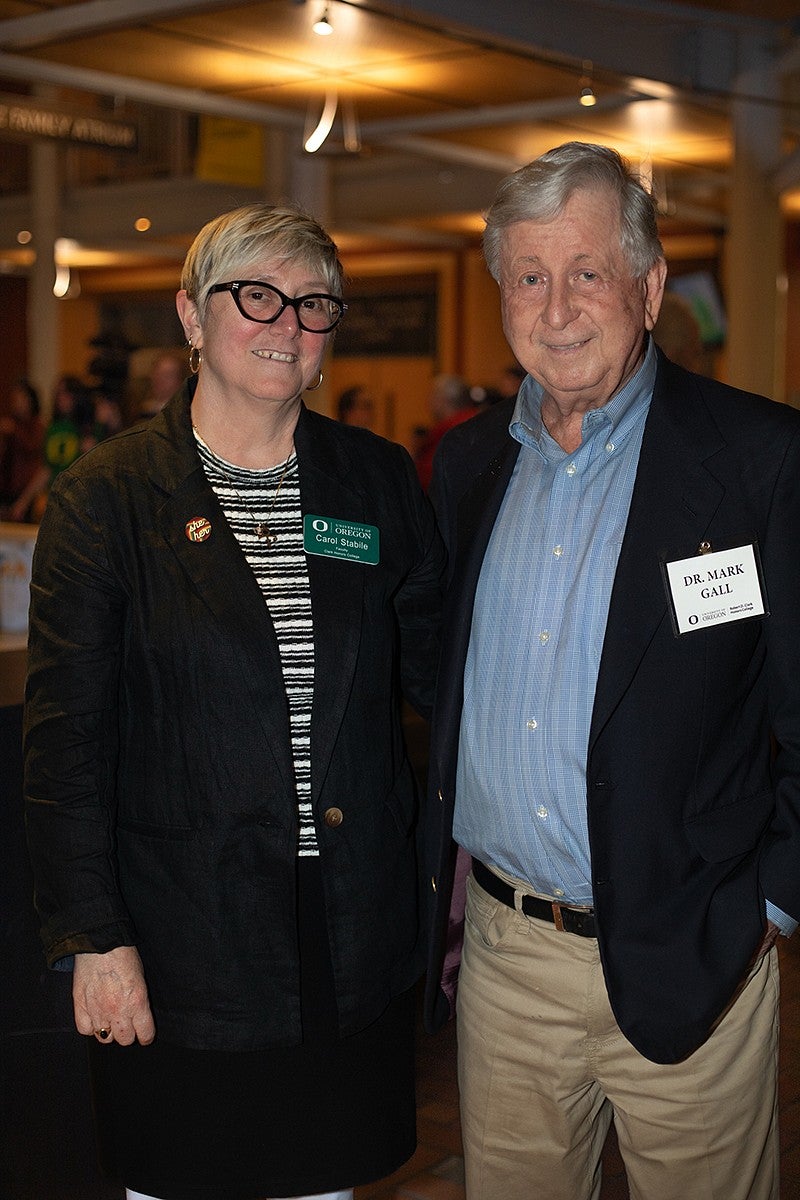
Dinh said he plans to use his prize money to pay for plane tickets over the summer to look at medical schools where he will be applying – the University of Michigan, UCLA and the University of California at San Francisco.
Johnston plans to save her prize money until she can figure out how to spend it. She is looking for a job in communications in the Portland metropolitan area.
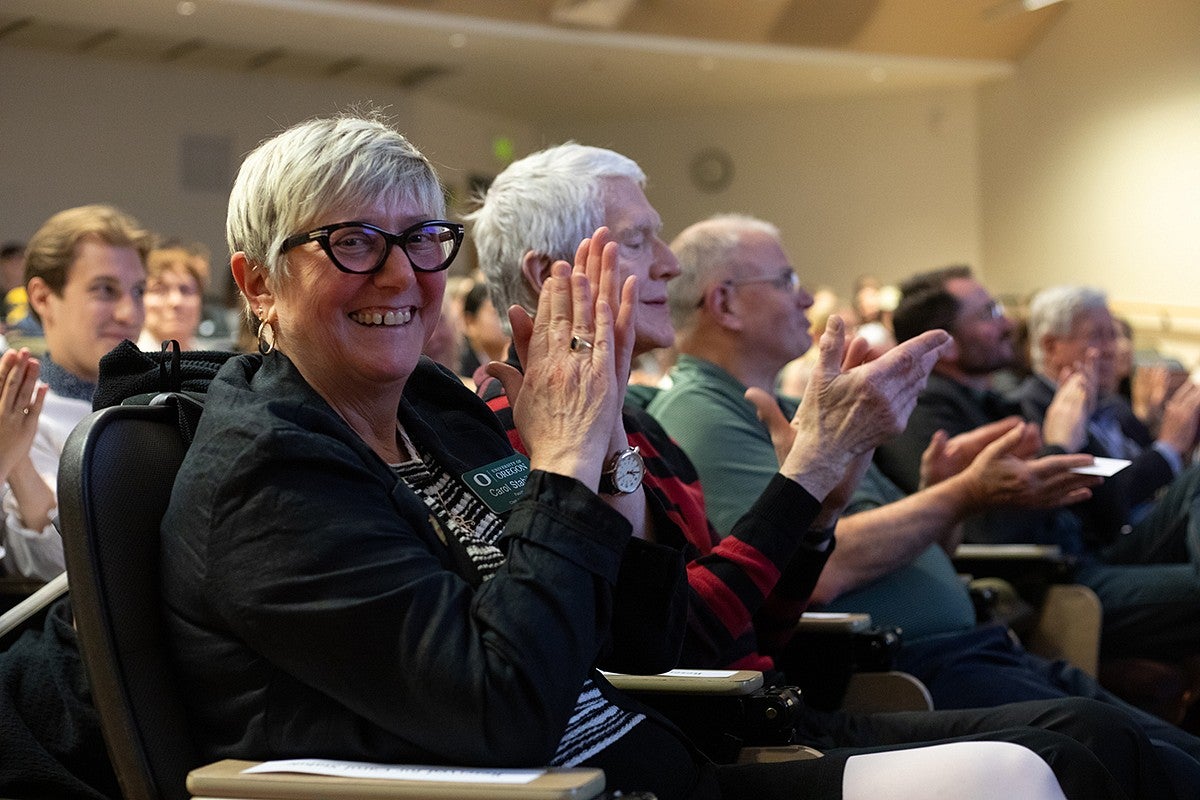
The 2024 CHC Three Minute Thesis finalists also included:
Ben Burress-Irving, Biochemistry
Computational Protein Design for Bone Healing
Hye Lynn Choi, Human Physiology
The Effects of Aging on Musculotendinous Stiffness at VL
Gwen Lyman, Global Studies
Cerrando la Brecha: Latinx Voices' on identity, community, and social entrepreneurship
Eden McCall, Journalism & Spatial Data Science and Technology
Saving Nature in Our Own Backyard: A Multimedia Science Story
Madi Serrano, Human Physiology
The Effects of Exercise and Heat Therapy on the Ambulatory Blood Pressure of Adults with Untreated Hypertension
Evelyn Woo, Chinese & Global Studies
Assessing Economic Espionage Allegations Against Huawei and Protecting U.S. Cybersecurity
Thank you to the Gall family for your support of CHC
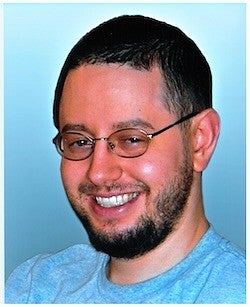
The Clark Honors College Three Minute Thesis Comptition is made possible by a generous gift from
Drs. Meredith (Mark) Gall
and Joyce (Joy) Gall
of Eugene, in memory of their son
Jonathan Gall
Jonathan graduated from the Clark Honors College in 1999 summa cum laude with a bachelor’s degree in psychology. Known to his family and friends as Jon, he was a member of Phi Beta Kappa, completed a thesis at the Honors College that explored whether similarity or difference in personality characteristics affects young adults’ attraction to members of the opposite sex, and worked very hard to follow his academic passions in the fields of education and psychology.
Jon’s future plans were interrupted when he was diagnosed with a rare neurological condition, which sadly proved to be fatal. Subsequently, Joy and Mark took it upon themselves to establish the Jonathan Gall Scholarship at the Honors College to memorialize their beloved son. For years, the scholarship has benefitted CHC students who, like Jon, have high academic achievement and career aspirations.
When Joy and Mark heard about the Three Minute Thesis Competition last year, they offered to pay for this year’s event in its entirety. We are very thankful to both of them for all their help in making sure the Three Minute Thesis Competition happens.
